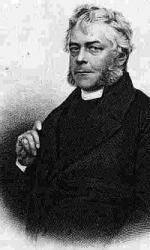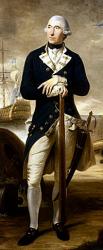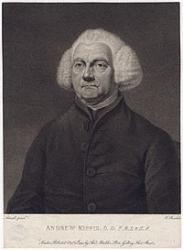Planning worship?
Check out our sister site, ZeteoSearch.org,
for 20+ additional resources related to your search.
- |
User Links
Person Results
‹ Return to hymnal



Export as CSV
Alice Flowerdew
1759 - 1830 Hymnal Number: 724 Author of "Fountain of mercy, God of love" in Psalms and Hymns Flowerdew, Alice, was born in 1759, and married to Mr. Daniel Flowerdew, who for a few years held a Government appointment in Jamaica, and died in 1801. After his decease Mrs. Flowerdew kept a Ladies' Boarding-school at Islington. During her residence at Islington she was a member of the General Baptist congregation, in Worship Street (now at Bethnal Green Road). Subsequently she removed to Bury St. Edmunds, and some years later to Ipswich, where she died Sept. 23, 1830.
In 1803 she published a small volume of Poems on Moral and Religious Subjects. This work reached a 3rd edition in 1811, and in that edition appeared her well-known harvest hymn, "Fountain of mercy, God of love," q.v. Mrs. Flowerdew's maiden name has not been ascertained. [Rev. W. R. Stevenson, M.A.]
--John Julian, Dictionary of Hymnology (1907)
Alice Flowerdew
David E. Ford

1797 - 1875 Hymnal Number: 644 Author of "How vain is all beneath the skies [sky]" in Psalms and Hymns Ford, David Everard, son of a Congregational Minister at Long Melford, was born there on Sept. 13, 1797. He became pastor of the Congregational Church at Lymington, in Oct. 1821; Travelling Secretary to the Congregational Union in 1841; and pastor of Greengate Chapel, Salford, Manchester, in 1843. He died at Bedford, Oct. 23, 1875. Mr. Ford published several works including, Hymns chiefly on the Parables of Christ, 1828. From this is taken, (1) "Earthly joys no longer please us" (Heaven Anticipated). (2) "How vain is all beneath the skies" (Heaven Anticipated). These are in American common use. See Hymns of the Church, 1869, and Laudes Domini, 1884. Another of his hymns in common use from the same work, p. 107, is:—"Almighty Father, heavenly Friend" (Old and New Year). This is in Dale's English Hymn Book, 1874.
--John Julian, Dictionary of Hymnology, Appendix, Part II (1907)
David E. Ford
Richard Kempenfelt

1718 - 1782 Hymnal Number: 718 Author of "Burst, ye emerald [pearly] gates, and bring" in Psalms and Hymns Kempenfelt, Richard, of Swedish descent, was born Oct., 1718. In Jan., 1741, he obtained a lieutenant's commission in the British Navy. He became captain in 1757, and admiral in 1780. He was drowned in the "Royal George," which sank in harbour at Portsmouth on Aug. 29, 1782. Admiral Kempenfelt was an admirer of Whitefield and the Wesleys, and interested himself much in evangelistic work. His hymns were published as Original Hymns and Poems. By Philotheorus. Exeter, printed by B. Thorn, 1777, and were dedicated "To the Rev. Mr. Fletcher, Vicar of Madeley, in Shropshire." They were reprinted, with a Preface, by D. Sedgwick, in 1861. Although most of these hymns are given in the older collections, only a few re¬main in modern hymn-books, and, including centos, are:—
1. Bear me on Thy rapid wing. Praise to Jesus in Heaven.
2. Burst, ye emerald gates, and bring. Praise to Jesus in Heaven.
3. Gentle Spirit, waft me over. Heaven desired.
4. Hail, Thou eternal Logos, hail. Adoration of Jesus.
5. Hark, 'tis the trump of God. The Last Day.
6. O my Redeemer, come. The Last Day.
Of these Nos. 1 and 2 are from the same hymn; and Nos. 5 and 6 also from another. The original texts of Nos. 3, 5, and 6 are in Lyra Britannica 1867, pp. 349-52.
--John Julian, Dictionary of Hymnology (1907)
Richard Kempenfelt
William Enfield
1741 - 1797 Person Name: W. Enfield Hymnal Number: 109 Author of "Behold, where in a mortal form" in Psalms and Hymns Enfield, William , LL.D., born at Sudbury, Suffolk, March 29, 1741, of poor parents. Through the assistance of Mr. Hextall, the local Dissenting Minister, at 17 he entered the Daventry Academy under Dr. Ashworth. His first pastorate was of the congregation at Benn's Garden, Liverpool, to which he ministered from 1763 to 1770. In conjunction with Rev. J. Brekell of Key St. chapel, he edited
A New Collection of Psalms proper for Christian Worship, in three parts. I. Psalms of David, &c. II. Psalms of Praise to God. III. Psalms on various Subjects. Liverpool. Printed in the year 1764. Known as the Liverpool Old Collection; Later eds., 1767, 1770, 1787. In this last, 60 more hymns are added to the 3rd part.
From 1770 to 1785 Enfield was at Warrington, as minister to the Old Presbyterian congregation, and as teacher of Belles-lettres and other subjects, in the Dissenting Academy founded there in 1757. He published in 1774, The Speaker; 1783, Institutes of Natural Philosophy, and other works, including:—
Hymns for Public Worship: selected from Various Authors, and intended as a supplement to Dr. Watts’s Psalms. Warrington. Printed for the Editor, 1772. 3rd ed. 1789. London. Printed for J. Johnson, St. Paul's Churchyard, and W. Kyres, Warrington. Contains 160 hymns, rather more than half being the same as in the Liverpool Collection. In this Collection some of Mrs. Barbauld’s hymns appeared for the first time.
From Warrington he proceeded to Norwich as pastor of the Octagon chapel, and died there Nov. 3, 1797. In 1791 he published an abridgment of Brucker's History of Philosophy , and at the time of his death was engaged with Dr. J. Aikin, son of his late colleague at the Warrington Academy, in bringing out a General Biographical Dictionar , vol. i. 1796. He also published A Selection of Hymns for Social Worship. Norwich. Printed by J. March for J. Johnson, St. Paul's Church¬yard, London, 1795. 2nd ed., 1797 ; 3rd ed., 1802. Lon-don, J. Johnson. Printed by W. Eyres, Horse Market, Warrington. Contains 232 hymns, more than half by Watts, and of the rest 93 were retained from the Warrington Collection.
In this Collection Enfield's own hymns first appeared, “Behold where in a mortal form" (Example of Christ); "Wherefore should man, frail child of clay" (Humility); and "O Thou, through all thy works adored" (God the Ruler of Nature). They are characteristic of the "moral preacher" and the Unitarian, and in taste are unexceptionable. Dr. Enfield received his degree from Edinburgh University. On his death Johnson brought out 3 volumes of his Sermons "on Practical Subjects,” with a Memoir by Dr. Aikin. [Rev. Valentine D. Davis, B.A.]
-- John Julian, Dictionary of Hymnology (1907)
William Enfield
Richard Burdsall
1735 - 1824 Hymnal Number: 275 Author of "Hallelujah to the Lamb who hath purchased" in Psalms and Hymns Burdsall, Richard, for many years a Wesleyan minister, was born in 1735, and died in 1824. To his Memoirs, published at York, n.d., is appended a hymn beginning, "Now Christ He is risen, the Serpent's head is bruised." The hymn “The voice of free grace cries—'Escape to the mountain,'" begins with stanza ii. of this hymn, but with alterations. In some American hymnals, including Hatfield's Church Hymn Book, 1872, Burdsall's two stanzas are expanded into five, but by whom we cannot say.
--John Julian, Dictionary of Hymnology, Appendix, Part II (1907)
Richard Burdsall
Benjamin Cleveland
1733 - 1811 Person Name: B. Cleveland Hymnal Number: 626 Author of "O could I find from day to day" in Psalms and Hymns Cleveland, Benjamin. Probably a Baptist, but known only by his Hymns on Different Spiritual Subjects, in Two Parts, whereof the 4th ed. appeared in Norwich, Connecticut, 1792. He is the author of:—
0 could I find from day to day. [Longing for Christ.] This was preserved from oblivion by the Hartford Selection 1799, and is now in general use as altered and abridged to 4 stanzas by Nettleton, in his Village Hymns, 1824, No. 145. What is supposed to be the original text of the first four stanzas is found in Dr. Hatfield's Church Hymn Book, 1872, No. 876. [Rev. F. M. Bird, M.A.]
--John Julian, Dictionary of Hymnology (1907)
============================
Cleveland, Benjamin. (Windham, Connecticut, August 30, 1733--March 9, 1811, Horton [now Wolfville], Nova Scotia). Baptist. Son of Benjamin Cleveland. The name is sometimes spelled "Cleavland" or "Cleaveland" in family records. He was a layman and a Baptist deacon; little else is known of his life except that of his twelve children, one, Nathan Cleveland, became a Baptist minister. He published in 1792 his Hymns on Different Subjects. In Two Parts in Norwich, Connecticut. His hymn, "O could I find from day to day," was widely reprinted through most of the nineteenth century. In his 1792 collection, it had six stanzas. Joshua Smith reprinted it in 1797, and it was altered for the Hartford Selection of 1799. Asahel Nettleton abridged it to four stanzas and altered it for his Village Hymns in 1824. It was in this form that it was widely sung; it was reprinted in the same for in Edwin Francis Hatfield's Church Hymn Book, 1872. the original first four stanzas treat the desire to "find from day to day a nearness to my God" throughout the course of life, ending in stanza 4 "Thus, till my last expiring breath, Thy goodness I'll adore . . ."
--Thomas W. Hunt, DNAH Archives
Benjamin Cleveland
Thomas Greene
1710 - 1779 Person Name: T. Green Hymnal Number: 655 Author of "My days, my [and] weeks, my [and] months, my [and] years" in Psalms and Hymns Greene, Thomas, of Ware, was for some time a member of the Congregational body in that town. In 1778 a minority of the members, of Arian principles, having obtained the lease of the chapel, the majority seceded and built themselves the "Old Independent Chapel." Mr. Greene was one of these seceders (Miller's Singers & Songs, 1869, p. 314). His Hymns and Poems on Various Subjects, chiefly Sacred, were published in 1780 (2nd ed., 1797). From this work the hymn "It is the Lord, enthroned in light" (Resignation), is taken. In Bickersteth's Christian Psalmody, 1833, it begins, "It is the Lord, my covenant God." In modern collections it is found in both forms. Another hymn from the same work is "The more my conduct I survey " (Trusting in Jesus), as in Spurgeon's 0ur Own Hymn Book, 1866.
--John Julian, Dictionary of Hymnology, Appendix, Part II (1907)
Thomas Greene
Robert Carr Brackenbury
1752 - 1818 Person Name: R. C. Brackenbury Hymnal Number: 260 Author of "My son, know thou the Lord" in Psalms and Hymns Brackenbury, Robert Carr, of an old Lincolnshire family, was born at Panton House, in that county, in 1752. He entered into residence at St. Catherine's Hall, Cambridge, but joining the Wesleys, he left without taking a degree, and became a minister of the Methodist denomination. In that capacity he visited Guernsey, Jersey and Holland. He retired from active work in 1789, and died at his residence, Raithby Hall, near Spilsby, Aug. 11, 1818.
His works include:—(1) Sacred Poems, in 3 parts, Lond., 1797; (2) Select Hymns, in 2 parts, Lond., 1795; (3) Sacred Poetry; or Hymns on the Principal Histories of the Old and New Testaments and on all the Parables, Lond., 1800, and some prose publications. He also edited and altered William Cruden's Divine Hymns, n.d. The hymn, "Come, children, 'tis Jesus' command," was given in J. Benson's Hymns for Children, 1806. It does not appear in any of Brackenbury's works. Mrs. Smith, daughter of Dr. Adam Clarke, has included several incidents in his life in her Raithby Hall.
-- John Julian, Dictionary of Hymnology (1907)
Robert Carr Brackenbury
W. Wrangham
Hymnal Number: P51f Author of "According to Thy word, Let me Thy mercy prove" in Psalms and Hymns Wrangham, W., p. 930. ii., 223. From his New Metrical Version of the Psalms, 1829, the following are in common use in America:— (1) "Eternal God, celestial King," Psalms Ivii; (2) "Praise the Lord, His power confess," Psalms cl.; (3) “To Thee, my righteous King and Lord," Psalms ciii.
--John Julian, Dictionary of Hymnology, Appendix, Part II (1907)
W. Wrangham
Andrew Kippis

1725 - 1795 Hymnal Number: 540 Author of "On thee, each morning, O my God, My waking thoughts attend" in Psalms and Hymns Kippis, Andrew, D.D., was born at Nottingham, March 28,1725, and educated for the ministry under Dr. Doddridge at Northampton, 1741-46. After a short residence with congregations at Boston and Dorking, he settled in London in 1753, as minister of the Princes Street Chapel, Westminster. There lie remained till his death in 1795, holding rank as the leading Presbyterian minister in the metropolis. For many years he was classical tutor at the Hoxton Academy, and afterwards at the Hackney College. He contributed largely to the Gentleman's Magazine and the Monthly Review, and edited five volumes of a new edition of the Biographia Britannica, a work commenced in 1778, and interrupted by his death on Oct. 8, 1795. His Life of Captain Cook was also published separately, and to his edition of Lardner's Works (1788) a Memoir was prefixed. His degree of D.D. was con¬ferred by the University of Edinburgh in 1767.
He was joint editor of A Collection of Hymns and Psalms for Public and Private Worship, selected and prepared by Andrew Kippis, D.D., &c. ; Abraham Rees, D.D., &c.; Rev. Thomas Jervis, and Rev. Thomas Mor¬gan, LL.D., London, 1795. This collection, commonly known as Kippis's, but sometimes as Kees's, passed through many editions, a Supplement being added in 1807, and was very generally used during the early decades of this century by congregations of Presbyterians and others, then become Unitarian in London and throughout the country [Unitarian Hymnody, § 9]. It contained 690 hymns.
The aim of the editors in their selection was to avoid “everything of a doubtful or disputable kind," and they adopt the language of Dr. Watts in the preface to his Hymns, "The contentious and distinguishing word of sects and parties are excluded." The alterations and omissions to adapt various hymns to the standard of the editors are considerable, though very little compared to what was done by others before and after them. The tone of the collection is somewhat colourless, and it gradually gave place among Unitarians to others which contained fuller and more varied expression of distinctively Christian feeling.
Two hymns by Kippis appear in this Collection.
1. Great God, in vain man's narrow view, The Incomprehensibility of God, which was generally adopted in later Unitarian books, and appears in Martineau's Hymns, 1840 and 1873.
2. How rich thy gifts, Almighty King, National Thanksgiving, which is four stanzas of the hymn, "Say, should we search the globe around," written for the thanksgiving appointed Nov. 29,1759, and appended to his Sermon on that occasion. It was given in full in Pope's Collection, 1760; and the Liverpool Octagon Collection, 1763. In Lindsey's Collection, 1774, five stanzas are given; in other early books only four, as in Kippis. The last two stanzas, somewhat altered, appear anonymously as: "With grateful hearts, with joyful tongues," in the Congregational Hymn Book, 1836, and the New Congregational Hymn Book, 1859.
[Rev. Valentine. D. David, M.A.]
--John Julian, Dictionary of Hymnology (1907)
Andrew Kippis


 My Starred Hymns
My Starred Hymns


